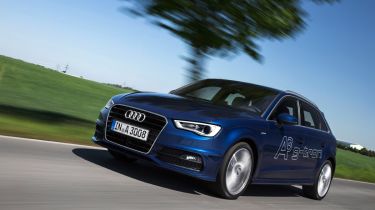Audi A3 Sportback g-tron
We drive the new gas-powered Audi A3 Sportback g-tron, which emits only 20g/km of CO2

This clever A3 is proof that Audi is leaving no stone unturned in its pursuit of efficiency. Wind-generated fuel that delivers genuine performance is great news for the internal combustion engine’s future – especially with the company readying petrol and diesel set-ups. Plus, the brand will be able to make a profit not only from selling its cars, but also the fuel powering them.
The futuristic Audi A3 Sportback g-tron isn't destined for the UK. But the significance of this car is its fuel.
The g-tron uses synthetic methane Audi has converted from wind energy at its new factory in Werlte, Germany.
Electricity produced by wind turbines is used to turn water into oxygen and hydrogen in three electrolyzers. Some hydrogen is stored for imminent fuel-cell Audis – a hydrogen A7 will start testing in August – and the rest reacted with CO2 to make e-gas.
What’s more, Audi is working on a similar process which uses CO2 to make petrol and diesel, using up some of the harmful emissions burning the fuels produces in the first place.
The synthetic e-gas is fed to selected fuel stations in Germany so it’ll be ready for use by g-tron customers later this year, with enough gas produced to fuel 1,500 of these special five-door A3s for 9,300 miles a year. While the car emits 95g/km of CO2, Audi says this is cut to 20g/km if you consider the gas plant’s well-to-wheel emissions.
Aside from a few badges, and separate instrument readouts for gas and petrol, the g-tron looks like any other A3. The 1.4-litre TFSI engine features a modified cylinder head, turbo and injection system, and two tanks under the boot floor store the gas.
On the road, the g-tron feels like a diesel. It remains smooth, but is relatively slow to respond at low revs. And while its 200Nm maximum torque is on tap from 1,500rpm, there’s no diesel-like surge of acceleration until the turbo kicks in at 2,500rpm.
We didn’t get to see what happens when the gas runs out and petrol takes over, but this is said to be imperceptible. Audi reckons you’ll get a range of 249 miles with gas, and a further 559 miles from the petrol tank.







